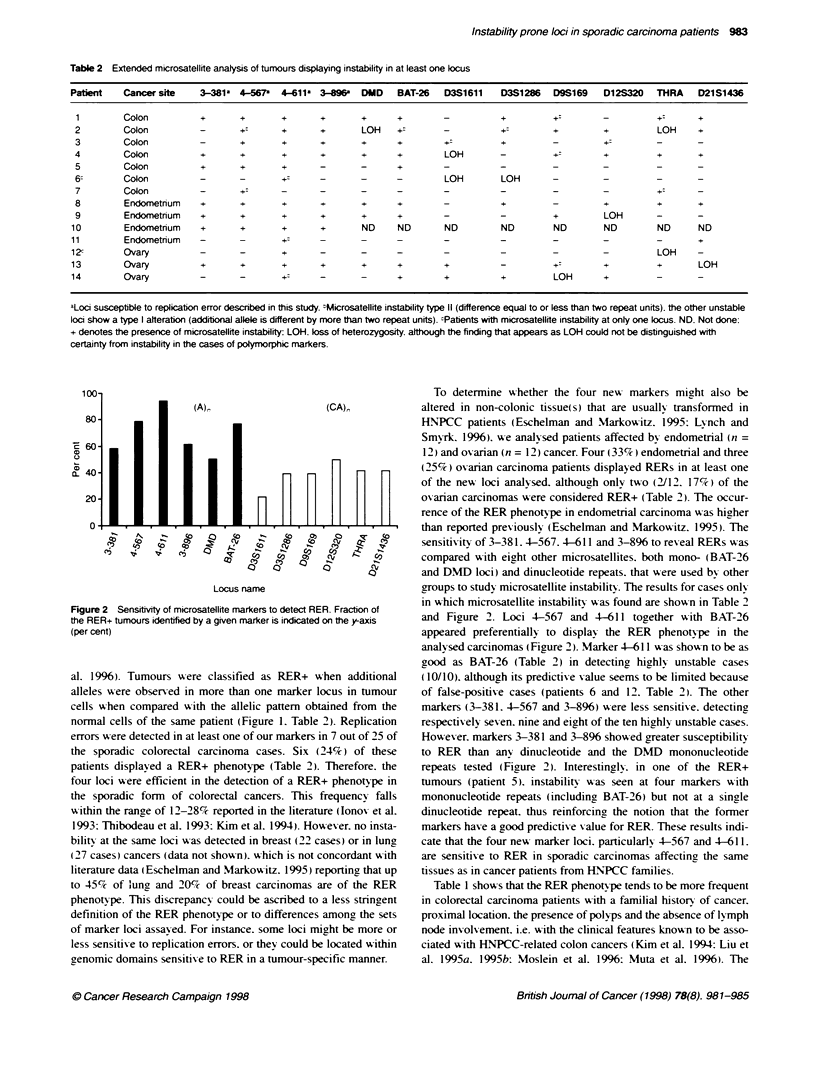Abstract
Microsatellite instability due to a deficiency in DNA mismatch repair is characteristic of a replication error (RER) phenotype. This widespread genomic instability is well documented in hereditary non-polyposis colon cancer (HNPCC) as well as subsets of sporadic carcinomas. Features of the RER phenotype such as the early appearance in tumour development and better prognosis of RER+ colorectal tumours render its examination important for cancer patients. Recently, we identified four loci that were shown to be highly susceptible to RER in cancer cells. Here, we used these loci to detect the RER phenotype in sporadic carcinomas of colon, breast, lung, endometrium and ovary. Replication errors revealed by these four markers followed the same tumour specificity as observed in HNPCC patients. In particular, 24% (6/25) of colorectal, 33% (4/12) of endometrial and 17% (2/12) of ovarian cancers displayed the RER phenotype characterized by an increased allelic mobility, whereas none of the breast (n = 22) and the lung (n = 27) carcinomas were found to be unstable. Assaying RERs sensitive loci provides us with a useful diagnostic tool for HNPCC-like sporadic tumours.
Full text
PDF




Images in this article
Selected References
These references are in PubMed. This may not be the complete list of references from this article.
- Baccichet A., Benachenhou N., Couture F., Leclerc J. M., Sinnett D. Microsatellite instability in childhood T cell acute lymphoblastic leukemia. Leukemia. 1997 Jun;11(6):797–802. doi: 10.1038/sj.leu.2400650. [DOI] [PubMed] [Google Scholar]
- Eshleman J. R., Markowitz S. D. Microsatellite instability in inherited and sporadic neoplasms. Curr Opin Oncol. 1995 Jan;7(1):83–89. [PubMed] [Google Scholar]
- Ionov Y., Peinado M. A., Malkhosyan S., Shibata D., Perucho M. Ubiquitous somatic mutations in simple repeated sequences reveal a new mechanism for colonic carcinogenesis. Nature. 1993 Jun 10;363(6429):558–561. doi: 10.1038/363558a0. [DOI] [PubMed] [Google Scholar]
- Jarnik M., Tang J. Q., Korab-Laskowska M., Zietkiewicz E., Cardinal G., Gorska-Flipot I., Sinnett D., Labuda D. Overall informativity, OI, in DNA polymorphisms revealed by inter-Alu PCR: detection of genomic rearrangements. Genomics. 1996 Sep 15;36(3):388–398. doi: 10.1006/geno.1996.0483. [DOI] [PubMed] [Google Scholar]
- Kane M. F., Loda M., Gaida G. M., Lipman J., Mishra R., Goldman H., Jessup J. M., Kolodner R. Methylation of the hMLH1 promoter correlates with lack of expression of hMLH1 in sporadic colon tumors and mismatch repair-defective human tumor cell lines. Cancer Res. 1997 Mar 1;57(5):808–811. [PubMed] [Google Scholar]
- Kim H., Jen J., Vogelstein B., Hamilton S. R. Clinical and pathological characteristics of sporadic colorectal carcinomas with DNA replication errors in microsatellite sequences. Am J Pathol. 1994 Jul;145(1):148–156. [PMC free article] [PubMed] [Google Scholar]
- Kolodner R. D. Mismatch repair: mechanisms and relationship to cancer susceptibility. Trends Biochem Sci. 1995 Oct;20(10):397–401. doi: 10.1016/s0968-0004(00)89087-8. [DOI] [PubMed] [Google Scholar]
- Krajinovic M., Richer C., Labuda D., Sinnett D. Detection of a mutator phenotype in cancer cells by inter-Alu polymerase chain reaction. Cancer Res. 1996 Jun 15;56(12):2733–2737. [PubMed] [Google Scholar]
- Krajinovic M., Richer C., Lukovic L., Labuda D., Sinnett D. Chromosomal assignment of loci susceptible to replication errors by radiation hybrid mapping. Mutat Res. 1998 May;382(3-4):81–83. doi: 10.1016/s1383-5726(97)00015-0. [DOI] [PubMed] [Google Scholar]
- Liu B., Farrington S. M., Petersen G. M., Hamilton S. R., Parsons R., Papadopoulos N., Fujiwara T., Jen J., Kinzler K. W., Wyllie A. H. Genetic instability occurs in the majority of young patients with colorectal cancer. Nat Med. 1995 Apr;1(4):348–352. doi: 10.1038/nm0495-348. [DOI] [PubMed] [Google Scholar]
- Lynch H. T., Smyrk T. Hereditary nonpolyposis colorectal cancer (Lynch syndrome). An updated review. Cancer. 1996 Sep 15;78(6):1149–1167. doi: 10.1002/(SICI)1097-0142(19960915)78:6<1149::AID-CNCR1>3.0.CO;2-5. [DOI] [PubMed] [Google Scholar]
- Malkhosyan S., Rampino N., Yamamoto H., Perucho M. Frameshift mutator mutations. Nature. 1996 Aug 8;382(6591):499–500. doi: 10.1038/382499a0. [DOI] [PubMed] [Google Scholar]
- Mao L., Lee D. J., Tockman M. S., Erozan Y. S., Askin F., Sidransky D. Microsatellite alterations as clonal markers for the detection of human cancer. Proc Natl Acad Sci U S A. 1994 Oct 11;91(21):9871–9875. doi: 10.1073/pnas.91.21.9871. [DOI] [PMC free article] [PubMed] [Google Scholar]
- Moslein G., Tester D. J., Lindor N. M., Honchel R., Cunningham J. M., French A. J., Halling K. C., Schwab M., Goretzki P., Thibodeau S. N. Microsatellite instability and mutation analysis of hMSH2 and hMLH1 in patients with sporadic, familial and hereditary colorectal cancer. Hum Mol Genet. 1996 Sep;5(9):1245–1252. doi: 10.1093/hmg/5.9.1245. [DOI] [PubMed] [Google Scholar]
- Muta H., Noguchi M., Perucho M., Ushio K., Sugihara K., Ochiai A., Nawata H., Hirohashi S. Clinical implications of microsatellite instability in colorectal cancers. Cancer. 1996 Jan 15;77(2):265–270. doi: 10.1002/(SICI)1097-0142(19960115)77:2<265::AID-CNCR7>3.0.CO;2-L. [DOI] [PubMed] [Google Scholar]
- Parsons R., Myeroff L. L., Liu B., Willson J. K., Markowitz S. D., Kinzler K. W., Vogelstein B. Microsatellite instability and mutations of the transforming growth factor beta type II receptor gene in colorectal cancer. Cancer Res. 1995 Dec 1;55(23):5548–5550. [PubMed] [Google Scholar]
- Rampino N., Yamamoto H., Ionov Y., Li Y., Sawai H., Reed J. C., Perucho M. Somatic frameshift mutations in the BAX gene in colon cancers of the microsatellite mutator phenotype. Science. 1997 Feb 14;275(5302):967–969. doi: 10.1126/science.275.5302.967. [DOI] [PubMed] [Google Scholar]
- Shibata D., Peinado M. A., Ionov Y., Malkhosyan S., Perucho M. Genomic instability in repeated sequences is an early somatic event in colorectal tumorigenesis that persists after transformation. Nat Genet. 1994 Mar;6(3):273–281. doi: 10.1038/ng0394-273. [DOI] [PubMed] [Google Scholar]
- Thibodeau S. N., Bren G., Schaid D. Microsatellite instability in cancer of the proximal colon. Science. 1993 May 7;260(5109):816–819. doi: 10.1126/science.8484122. [DOI] [PubMed] [Google Scholar]
- Thibodeau S. N., French A. J., Roche P. C., Cunningham J. M., Tester D. J., Lindor N. M., Moslein G., Baker S. M., Liskay R. M., Burgart L. J. Altered expression of hMSH2 and hMLH1 in tumors with microsatellite instability and genetic alterations in mismatch repair genes. Cancer Res. 1996 Nov 1;56(21):4836–4840. [PubMed] [Google Scholar]
- de la Chapelle A., Peltomäki P. Genetics of hereditary colon cancer. Annu Rev Genet. 1995;29:329–348. doi: 10.1146/annurev.ge.29.120195.001553. [DOI] [PubMed] [Google Scholar]



